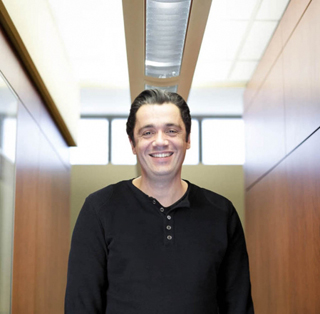
|
|
|
In this issue :
Learning to work with patients as partners | Community pharmacist opens doors to future doctors
| Chronic pain : raising the topic |
Evaluating patients' lifestyle habits : important for supervisors ?
| Tell us what you're up to ! |

|
|
Learning to work with patients as partners
 Vincent Dumez
Vincent Dumez
Launched last October, the Bureau facultataire de l'expertise patient-partenaire of the Faculté de médecine at Université de Montréal has already gotten a lot of attention. And rightly so! It completely redefines relationships between health professionals and their patients.
By involving patients and their loved ones to a greater degree in the care process, the caregiving team adopts new ways of talking with their patients and thus offer possibilities of making informed and shared decisions on pertinence and choice of treatment.
Since January 2011, community medicine clerkship supervisors have added an activity to the program designed to encourage fourth-year students to think about how to integrate patients into care-providing teams. Based on a clinical scenario in which a patient has had three chronic pathologies for several years, students have to develop an inter-professional approach where the patient-partner is at the heart of care provision.
Students present their work to Vincent Dumez, Director of the Bureau facultataire, and Paule Lebel, Director of the Innovations pédagogiques et stratégies d'apprentissage sector at the Centre de pédagogie appliquée aux sciences de la santé (CPASS). Their contribution, which is greatly appreciated, enhances reflection and makes future physicians even more aware of the importance of involving patients in their own care.

|
|
Community pharmacist opens doors to future doctors

Photo : Louise LefortPharmacists play a central role in patient care. Yet, physicians do not always fully understand this role. For the past several years, the faculty of medicine at Université de Montréal has provided an opportunity for students to spend a few half days with a community pharmacist in neighbourhood pharmacy.
Through this experience, students realize that the medical prescription is a valuable communication tool between doctors and pharmacists. When well filled out, a prescription allows the pharmacist to provide quality service and avoid mistakes. Behind the counter, students become familiar with the problems that pharmacists have to deal with on a daily basis (unreadable prescriptions, missing information, doctor hard to reach), and from which patients are the first to suffer.
When students become aware of these issues, they can reflect on the need for collaboration between pharmacists and physicians, and can ask themselves how it can be improved. Here's what one student had to say: "This clerkship [...] gives a good overview of how pharmacies work and of the pharmacist's role. I think that all medical students should be informed of this so they can see pharmacists as allies and professionals who have very useful complementary knowledge.."
Michelle Normandeau, the instructor responsible for this session and a pharmacist consultant at Direction de la santé publique de Montréal, hopes to offer all externs in community medicine the chance to benefit from this invaluable field experience.

|
|
Chronic pain : raising the topic
Chronic pain can have many effects on the affected person. It can change the individual's lifestyle habits, prevent him or her from fulfilling social roles, and significantly alter life plans. Chronic pain is often misunderstood; people who suffer from it should be taken seriously and their pain should not be underestimated. The importance of developing new collaborative, patient-centred care approaches is increasingly acknowledged.
To raise the awareness of future doctors, the Clinique d'adaptation à la douleur chronique du Centre de réadaptation Lucie-Bruneau has been added to the list of field experiences for externs at the Université de Montréal's faculty of medicine. Martine Baillargeon, medical consultant at Direction de la santé publique de Montréal, supervises this part of the clerkship. Students who choose this training environment learn and understand the basic concepts of chronic pain and become familiar with various approaches that are based on interdisciplinarity and full patient involvement in decisions concerning his or her health.
A student presentation on chronic pain was deemed by peers to be the best from among 30 made last month. The title of Quoc Dinh Nguyen and Olga La Manna's presentation was "On n’accepte pas de vivre avec la douleur chronique, on s’y adapte." (We don't accept to live with chronic pain. We adapt!) Congratulations to these two students!

|
|
Evaluating patients' lifestyles habits : important for supervisors ?
For general practitioners, annual follow-ups and new patient assessments are opportune times to evaluate lifestyle habits that can affect patient health. Data from the 2010 MPAC study of family medicine graduates at Université de Montréal and Université Laval provide a picture of the lifestyle habits supervisors deem to be most important.
According to residents, most supervisors attach great importance to evaluating a patient's smoking status, alcohol consumption and body mass index (BMI). They give less importance to evaluating a patient's waist circumference, level of physical activity and risky sexual behaviours. About 20% of respondents said their supervisors attached little or no importance to evaluating these factors. (Click here to see the results).
The scientific literature shows that measuring waist circumference and BMI more accurately predicts the risk of heart disease, type 2 diabetes and metabolic syndrome than measuring BMI alone. Moreover, it is recognized that physical activity is an effective way of preventing the most common chronic illnesses. For someone who is sedentary, any increase in physical activity, no matter how small, is beneficial for health.
These study results raise questions for us: Would patients be more concerned about leading healthier lives if physicians showed more interest in their lifestyle habits?

|
|
Tell us what you're up to!
 The Espace Prévention infoletter is a communication tool for anyone interested in better preparing future doctors for the roles they will play in prevention. If you are developing prevention activities or educational tools, please submit an article to the infoletter or contact us. The Espace Prévention infoletter is a communication tool for anyone interested in better preparing future doctors for the roles they will play in prevention. If you are developing prevention activities or educational tools, please submit an article to the infoletter or contact us.
Contact : Dre Brigitte Maheux, brigitte.maheux@umontreal.ca


|
|
|